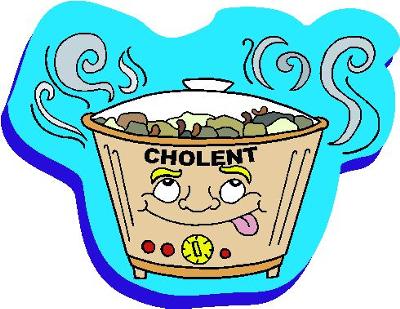Some pronounce it in one syllable: CHOLNT
Virtually all Jewish communities evolved some form of cholent, some kind of bean or barley stew which is sealed up in the oven to stay warm until Shabbat morning. This custom evolved as a kind of necessity: since it is forbidden to cook on Shabbat, yet we want to have hot food in the morning, the only viable option is to seal the food in a warm place and leave it all night.
But this necessity became in time something close to an actual minhag, or obligatory custom. The Rama writes: It is a mitzva to seal CHAMIN [literally hot food, but more specifically, the Hebrew word for cholent] for Shabbat, in order that he should eat CHAMIN [here in the literal meaning of hot food] on Shabbat, for this is the honor and enjoyment of Shabbat. And anyone who doesn’t believe in the words of the Sages, and forbids eating hot food on Shabbat, there is a suspicion that he may be a denier. (SA OC 257:8.)
The Mishna Berura cites an early source for this view, a little poem found in the Baal HaMaor commentary on the Rif: Some say that it is a decree of the Sages to have Shabbat delight with CHAMIN, and anyone who doesn’t eat CHAMIN is suspected perhaps he is a MIN [denier]… and to prepare to cook CHAMIN and to make the Shabbat a delight and fatten, this is the true believer and he will merit to see the end of days (16b on the Rif pages).
The simple understanding of why a person who doesn’t store away CHAMIN would be suspected of denial is that the Karaites, who professed a literal reading of scripture, did not allow fire in their houses at all on Shabbat and thus could not seal CHAMIN in the oven. But this is only a partial explanation. After all, there must be many things which the Karaites forbid which we could distinguish ourselves by permitting. From the words of both the Rama and the Baal HaMaor it seems that an equally important factor is the importance of oneg Shabbat, Shabbat delight.
Of course, it is vitally important to refrain from Melacha, forbidden labor, on Shabbat, whether forbidden by Scriptural or Rabbinical decree.
But a person who is so strict with these rulings as to deny himself one of the most basic delights of Shabbat, namely a warm meal on Shabbat day, is suspected of misunderstanding the entire point of Shabbat. It is true that Shabbat is a ZECHER LEMAASEH BERESHIT, a commemoration of the Creation, and our rest from creative labor on Shabbat mirrors and testifies to God’s rest on the seventh day of creation. But Shabbat is equally a forward-looking holiday, ME’EIN OLAM HABA, a taste of the World to Come. A person who recognizes only the first of these foundations has an understanding which is not only incomplete, because it is missing the second foundation, but it actually erroneous, because it misunderstands even that foundation which it adopts.
When God made the world with a limit, by refraining from Creation at a certain time, he made it finite and thus perfectible, ensuring that human effort is capable of bringing about an ideal future existence, which will reach its full fruition in the time of Moshiach. So the testimony to God’s rest at the beginning of history is in fact inseparable from the anticipation of God’s redemption at its end. The intimate relationship between these two aspects of Shabbat is thus embodied in the most mundane and yet sublime emblem of our Shabbat experience: our cholent.
Rabbi Asher Meir is the author of the book Meaning in Mitzvot, distributed by Feldheim. The book provides insights into the inner meaning of our daily practices, following the order of the 221 chapters of the Kitzur Shulchan Arukh.
The words of this author reflect his/her own opinions and do not necessarily represent the official position of the Orthodox Union.
